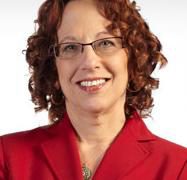CBC ombudsman: Decision to air interview with Ottawa bus driver’s widow was correct
When the Ottawa Morning Show ran an interview with Terry Woodard, the widow of the driver of the Ottawa bus that collided with a train, there was quite a lot of reaction. The interview was raw and painful to listen to. Was it the wrong decision to air it? The complainant, Chris Young, thought it was sensationalistic and should not have been done, even if Ms. Woodard agreed to it. The CBC's ombudsman Esther Enkin says the interview was hard to listen to, but agreed with the decision to air it.
 By Esther Enkin, CBC Ombudsman
By Esther Enkin, CBC Ombudsman
When the Ottawa Morning Show ran an interview with Terry Woodard, the widow of the driver of the Ottawa bus that collided with a train, there was quite a lot of reaction. The interview was raw and painful to listen to. Was it the wrong decision to air it? The complainant, Chris Young, thought it was sensationalistic and should not have been done, even if Ms. Woodard agreed to it. And when he realized the program received quite a few objections, he asked me to review the decision to air the interview. I agreed it was hard to listen to, but agreed with the decision to air it.

COMPLAINT
You first wrote directly to the Executive Producer of Current Affairs in Ottawa to express your objection to an interview with Terry Woodard, the widow of Dave Woodard who was driving the bus that collided with a train in suburban Ottawa. The interview aired on Ottawa Morning on Sept 19. You felt the interview was in bad taste, and just because “Terry was willing to be interviewed, does not mean you have to interview her.” You dismissed as a rationalization that she needed to talk to express her grief:
“Anyone with common sense and empathy would realize that there is a difference between talking to the nation and talking to a counselor one on one. Your producer could have been of much more benefit to her by suggesting a grief counselor. But in this age of instant messaging and twitter, we seem to react then think, rather than thinking then reacting.”
When the Executive Producer responded to you, explaining why the programmers went ahead with the interview, you disagreed with the reasons, again referring to them as rationalizations for airing it:
“Every situation can obviously have many different opinions. Mine (and some others?) is very opposite to yours. I would have expected such an interview from sensationalist seeking media, but not the CBC.”
Related content on J-Source:
- 10 tips for covering funerals
- How CBC covered the Ottawa train crash
- Ombudsman: CBC got it right covering local demonstration about Egypt
MANAGEMENT RESPONSE
The Executive Producer of Current Affairs in Ottawa, Ruth Zowdu, responded to your concerns.
She did so by sharing an explanation of the programmers’ thinking in airing the interview. The explanation was also published along with the web account of the interview with Ms. Woodard. The response was written by the station’s Managing Director, Jane Anido, in response to the people who questioned the decision to air the interview.
[node:ad]“Ms. Woodard is a person who is impacted by this tragedy and as such is someone we would go to for her perspective. She is also uniquely positioned to be able to give insight on how her husband, the driver of the bus, was on the morning of the accident. This information is important to our understanding of what happened.
In any situation where someone has suffered a loss, our aim is to treat the people involved with great sensitivity. In this case, we did not press Ms. Woodard to speak with us. We approached her sensitively and she, without pressure, agreed to speak on the record. In fact she wanted to.
During the conversation that followed, our host gave Ms. Woodard the opportunity to share the love she felt for her husband. We also, as I mentioned, tried to deepen our understanding of the story — both the emotional impact and the facts.
We feel it was important to remember the painful, human part of this story. We heard from many eye witnesses on Wednesday who described what they experienced on the bus. We felt it was important, when given the opportunity, to learn more about Dave Woodard and the kind of man he was. His wife was the best person to share that side of the story.
We understand from the audience perspective that it was fresh and raw and hard to hear in the wake of the crash but feel we were cautious and sensitive in our connection with Ms. Woodard and remain confident in our decision that the interview was important in further illuminating the emotional and factual aspects of the story.
We are grateful that she was willing to speak with us and to share her thoughts about the man she loved and lost. Although the conversation was a highly emotional one, we feel that it provided a key perspective on this quickly evolving story.”
You felt these were all just rationalizations and because there were others, like you, who thought running the interview was a bad decision, it would be a good idea for the ombudsman to review the issue.
REVIEW
When tragedies strike, journalists have an obligation to get the facts, often confusing at the outset, and to make sense of what has happened. They also have a role to play in humanizing the disaster – to learn about and to tell the stories of the people who died, as well as the impact on their families and friends who live on. There is also the very human need and desire to want an immediate answer to why and how it happened. That answer can take months, as it may very well in the case of this OC Transpo bus and train collision. But that doesn’t stop the speculation, or the need to ask some questions.
In the case of this incident, it was widely reported on the day of the accident that passengers were screaming for the driver to stop. It is a chilling detail, and logically leads to the question about why he may not have. Who he was and what his history as a driver was became an important part of the story.
To continue reading this review, please go the CBC ombudsman’s website where this was originally published.
Tamara Baluja is an award-winning journalist with CBC Vancouver and the 2018 Michener-Deacon fellow for journalism education. She was the associate editor for J-Source from 2013-2014.


